Signs of heart failure need to be recognized immediately
Heart failure is a condition in which the heart muscle cannot meet the needs of circulatory supply (bringing oxygen-poor blood from all over the body to the heart and then to the lungs and bringing oxygen-rich blood from the lungs back to the heart and then pumping throughout the body).
There are many symptoms that occur acutely or chronically. The disease can occur at any age from young to old. The forms of heart failure are also different (left ventricular failure, right ventricular failure, failure of both ventricles); different levels: mild failure, moderate failure and severe failure.
 |
The main causes of heart failure can be due to acquired heart disease, arrhythmias and some diseases outside the heart such as: high blood pressure, severe anemia due to acute blood loss, acute hemolysis, hyperthyroidism, poisoning... Heart failure can occur acutely in some patients without previous symptoms. Causes include myocardial infarction, myocarditis and acute valvular regurgitation due to endocarditis or other pathological conditions...
If you find yourself feeling out of breath after climbing a few flights of stairs, you should be concerned about your heart health. This could be due to congestion in the lungs, which can lead to shortness of breath, a very common and early sign of heart failure. When the heart muscle becomes weaker and cannot pump blood effectively, it affects other vital organs and their functions. The kidneys respond by storing fluid and salt in the body. This leads to fluid buildup in the arms, legs, ankles, feet, lungs and other organs, and the entire body becomes congested.
Weight gain may not seem to be linked to heart disease. But remember that obese people often have heart disease and it may be because obesity makes the heart work harder and the heart muscles become weaker. There are a number of other causes such as heart failure due to excess fluid (in some cases, too much fluid is retained in the circulatory system, causing the heart to overload, causing heart failure, such as excessive fluid transfusion, kidney failure, cirrhosis), heart failure due to vitamin B1 deficiency (often found in alcoholics, malnutrition), heart failure in endocrine diseases such as hypothyroidism or hyperthyroidism. However, about 40% of heart failure cases cannot find a specific cause.
Two signs of heart failure to pay attention to
Heart failure causes shortness of breath: Feeling short of breath, lack of air, suffocation. This is the earliest and most common symptom. In acute heart failure, shortness of breath appears suddenly and worsens rapidly if not treated promptly. In chronic heart failure, the symptoms of shortness of breath depend on the severity and progression of heart failure. Initially, shortness of breath only appears when exerting oneself such as climbing stairs, walking a long distance, carrying heavy objects or during sexual activity.
Later, shortness of breath appears more frequently, even when resting, even when sleeping, causing the patient to have to sit up to breathe. Shortness of breath is manifested by rapid breathing, if severe shortness of breath is often accompanied by signs of purple skin on the lips and tips of the toes and hands. However, it should be noted that shortness of breath is not a symptom only of heart failure, but also a manifestation of many other diseases. Therefore, in reality, it is often difficult to distinguish exactly the cause of the above signs is due to heart failure or lung disease or other pathological conditions.
Heart failure causes edema: Edema in heart failure is a consequence of fluid retention in the body. Because when the heart fails, the contractility of the heart muscle decreases, blood to the organs in the body is not as full as normal and does not circulate back to the heart, leading to fluid retention in the soft tissues, causing edema. In addition, when the amount of blood to the kidneys is not enough, this organ will secrete substances that cause water and salt retention in the body.
Lifestyle changes for a healthy heart
Eat a low-salt diet (reduced salt, no MSG...)
Limit fluid intake (drinking and eating) especially when seriously ill.
Go on a weight loss regimen if you are obese.
Do not drink alcohol especially for patients with alcoholic heart failure.
No smoking.
Appropriate physical activity.
Regularly monitor weight, weight gain is an early sign of fluid retention in the body, worsening heart failure.
Take time to rest, especially when tired.
Take medication regularly as prescribed. Do not stop taking it or change the dosage without consulting your doctor.
According to Agriculture
| RELATED NEWS |
|---|



